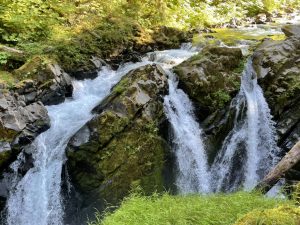 The Columbia City Yoga on-line Moving into Meditation class met this morning. We explored how our practice can help us to see and think clearly.
The Columbia City Yoga on-line Moving into Meditation class met this morning. We explored how our practice can help us to see and think clearly.
We can recognize and experience our intimacy with our human and more-than-human relations. We can become intimate with life. This intimacy can free our imaginations and open our hearts to include the more-than-human world.
We heard from nature writer Robert Macfarlane’s new book, Is a River Alive? Robert invites readers on a journey to three rivers across the world. In Ecuador, India and Canada, local people introduced Robert to their endangered rivers and the work they are doing to protect them. Their efforts center around a recognition of rivers as living beings worthy of our respect and even reverence.
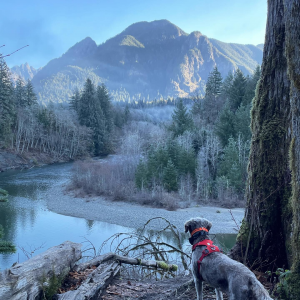 We also heard some of Robert’s conversation with Emergence Magazine editor Emanuel Vaughan-Lee. Together they explore humans’ relationship with rivers and more-than-human earthlings. Robert’s living questions reveal how “our fate flows with that of rivers—and always has.”
We also heard some of Robert’s conversation with Emergence Magazine editor Emanuel Vaughan-Lee. Together they explore humans’ relationship with rivers and more-than-human earthlings. Robert’s living questions reveal how “our fate flows with that of rivers—and always has.”
We heard William Martin’s poem, We Are a River, drawn from Martin’s book, The Sage’s Tao Te Ching: Ancient Advice for the Second Half of Life.
Welcome. Last week we explored embodied creatureliness. It is through our bodies, hearts and minds we perceive ourselves and the world around us; time and life’s unfolding mystery.
This week I pondered the mystery with naturalist writer Robert Macfarlane who spent four years with the question “Is a River Alive?” He begins his book about this experience with a quote from Ursula Le Guin:
One way to stop seeing trees or rivers or hills only as ‘natural resource’ is to class them as fellow beings – kinfolk. I guess I’m trying to subjective the universe, because look where objectifying has gotten us. To subjectify . . . may involve a great reach outward of the mind and imagination.
The deteriorating state of Robert’s homeland rivers in England and Wales led him to journey to three rivers across the world. In Ecuador, India and Canada, local people introduced Robert to their endangered rivers and the work they are doing to protect them. Their efforts center around a recognition of rivers as living beings worthy of our respect and even reverence.
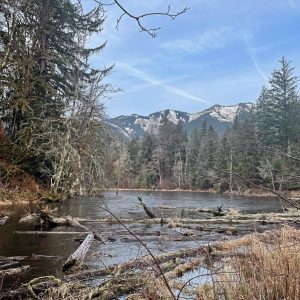 In his conversation with Emergence Magazine editor Emanuel Vaughan-Lee Robert reminds us or our embodied “riverliness:”
In his conversation with Emergence Magazine editor Emanuel Vaughan-Lee Robert reminds us or our embodied “riverliness:”
. . . since rivers run through everyone, . . . everyone has a story to tell. Everyone has a river to speak of and sing of. And that’s wonderful. Absolutely wonderful. It is torrenting. . . . a river runs through each of us, and a river runs through human history. The first cities grew on the banks of rivers.
This reminds me that our internal rivers are part of the greater watersheds in which we live along with other humans and more-than-human beings. A river is never just a river. Rivers are a source of healing, life and mystery. Robert described speaking with rivers and asking river people:
. . . what happens when you reimagine a river as alive? As having a life, having a death, and even having rights? . . . Each river is differently spirited and differently tongued—and so must be differently honored.
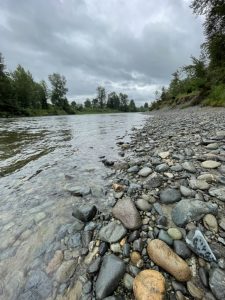 These are living questions: How do I relate to the rivers and waterways in my life? How do I consider the more-than-humans living on their courses and tributaries? How do I safeguard them?
These are living questions: How do I relate to the rivers and waterways in my life? How do I consider the more-than-humans living on their courses and tributaries? How do I safeguard them?
When rivers become sick and die all the more-than-human life they sustain also disappears. Robert spoke of E.O. Wilson’s age of the Eremocene: an age in which the “Great Animal Orchestra” falls silent:
The Eremocene [is] the age of loneliness. The epoch of loneliness. The loneliness that comes not from isolating oneself in a busy world and seeking temporary refuge, but actually from silencing the whole of the rest of the world.
Over the past years of living in a river valley I’ve noticed fewer insects, birds, amphibians, fish, raccoon, deer and elk. I am so grateful for the birdsong I continue to hear, the banana slugs I see and even the paper wasps and spiders.
Robert also reminds us that “hope is the thing with rivers.” He believes:
it’s important that . . . we stay with the trouble and recognize the crisis. . . . there’s a great deal of hope here. . . . we’ve just lived through and watched the extraordinary story of the . . . the Klamath River… the removal of the Iron Gate Dam . . . . And then this astonishing moment . . . when the first Chinook salmon was caught on scientists’ sonar going up where the Iron Gate Dam stood, two weeks after [it] had come down—270 miles up the river, up to the upper watershed!
And life pours back. We can wound our rivers easily, but given the right circumstances, they heal themselves astonishingly fast, and they heal us too. . . . I saw that again and again in these river years, these river journeys, watching people brought back to life by rivers, as well as rivers being brought back to life by people.
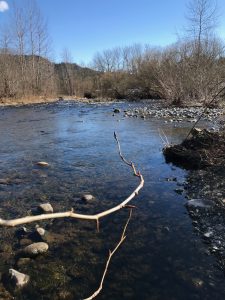 I know this from personal experience. When we moved to a little house on a little river, my partner’s body was wasting away with an undiagnosed illness. Day by day he sat by the river doing nothing through those Spring and Summer days. Gradually he regained his health. In the Fall he could marvel at the returning salmon vigorously moving through their river journeys.
I know this from personal experience. When we moved to a little house on a little river, my partner’s body was wasting away with an undiagnosed illness. Day by day he sat by the river doing nothing through those Spring and Summer days. Gradually he regained his health. In the Fall he could marvel at the returning salmon vigorously moving through their river journeys.
Our life journeys are those of healing and hope. Our practice helps us see and think clearly, to experience our inter-being. We can recognize and experience our intimacy with our human and more-than-human relations. We can become intimate with life. This intimacy can free our imaginations to feel ourselves as tree bodies, animal bodies, bird and fish bodies. We can feel ourselves as water. Here is William Martin’s free-verse interpretation of the classic work by Lao Tzu:
We Are a River
Our life has not been an ascent
up one side of a mountain and down the other.
We did not reach a peak,
only to decline and die.
We have been as drops of water,
born in the ocean and sprinkled on the earth
in a gentle rain.
We became a spring,
and then a stream,
and finally a river flowing deeper and stronger,
nourishing all it touches
as it nears its home once again.
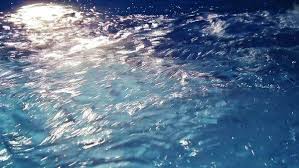 I invite you to take a few deep slow breaths. Let these out-breaths flow out into the river of life around you. Let the in-breath return naturally. Allow yourself to find rest in the shallows of the empty out-breath. Relax your shoulders and rest your arms and hands in comfort.
I invite you to take a few deep slow breaths. Let these out-breaths flow out into the river of life around you. Let the in-breath return naturally. Allow yourself to find rest in the shallows of the empty out-breath. Relax your shoulders and rest your arms and hands in comfort.
You might move awareness through the body: arms and hands, chest and belly, legs and feet. Allow the soft tissues to relax over the contours of face and neck. I invite you to notice how your body arises from Earth’s body. Feel Earth supporting you. You can sense aliveness: the water bathing, flowing and pooling inside. You can sense the inner fire of the body’s metabolic workings. Feel the currents of air moving through lungs into tissues and cells.
When the breath comes in, you might sense the body as a field of energy. Notice how effortless it is to be part of the greater field of life’s energy. Our bodies, our are nourished as we breathe in. We, in turn, are nourishing green beings – bacteria, algae, plants and forests, as we breathe out. Our very act of breathing takes us beyond the edges of our skin.
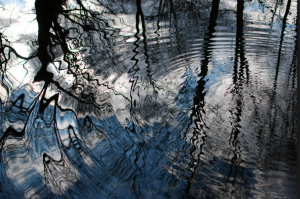 I invite you to consider expanding the boundaries of self. Imagine a greater all inclusive self. You might reflect on some being, some kin, that is dear to you. We belong to the family of trees, flowers, four leggeds, winged ones, soil and rocks. We belong to the fresh and salty waters, the scaled and hard shelled ones.
I invite you to consider expanding the boundaries of self. Imagine a greater all inclusive self. You might reflect on some being, some kin, that is dear to you. We belong to the family of trees, flowers, four leggeds, winged ones, soil and rocks. We belong to the fresh and salty waters, the scaled and hard shelled ones.
Who or what have you let yourself fall in love with? Who or what do you imagine you could give your love to? Our love enlivens our imagination. How will you bring your loving imagination to the world?
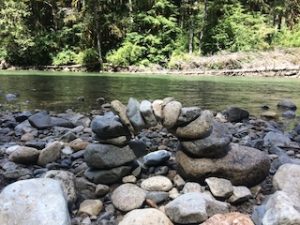 Yuvan Aves, the Chennai-based river defender told Robert:
Yuvan Aves, the Chennai-based river defender told Robert:
My own spiritual observation has been that a small ‘self’ suffers and causes suffering, that a love of the living world lets single identities and selfhoods expand and encompass other beings, entities and whole landscapes, such that the self becomes a spacious thing.
We share a spiritual practice that holds life sacred. May we offer what we can for the benefit of all beings.
